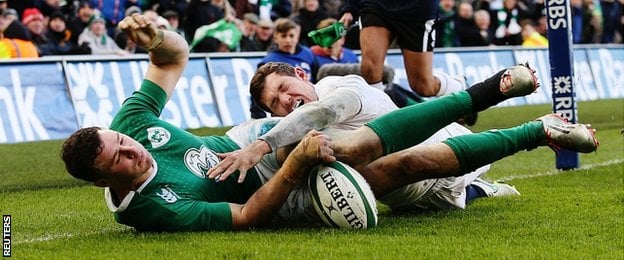Ireland march on towards a possible Grand Slam after inflicting a thumping defeat on a misfiring England.
Four penalties from Jonathan Sexton and a second-half try from centre Robbie Henshaw opened up an unbridgeable gap which accurately reflected the one-sided nature of what was expected to be a tight contest.
England were outplayed in all departments, starting slowly, consistently second-best at the breakdown and all too fallible under the high ball until a late rally.
After all the optimism engendered from their unbeaten start to the Six Nations this will go down as one of the most chastening defeats of Stuart Lancaster’s regime.
With trips to Wales and Scotland still to come, Ireland face a testing March if they are to win a second consecutive Six Nations title, let alone a second Grand Slam in six years.
But after this record-equalling 10th successive Test victory, Joe Schmidt’s men will travel with optimism, their status as the northern hemisphere’s most effective team underlined in some style.
Ireland had begun at pace, turning over a sleepy England at the first breakdown and winning two quick penalties to allow Sexton to kick them into an early six-point lead.
George Ford replied with a drop-goal on England’s first foray into the Irish half but his side twice wasted fine territory through lost line-outs and, after Luther Burrell was overrun by green shirts on his own 22, Sexton’s third simple penalty made it 9-3.
Ireland were dominating the breakdown, England twice penalised for offside as they struggled to cope with the ferocity of the Irish attacks.
Sexton was relishing his battle with the young apprentice Ford, smashing him backwards in the tackle and orchestrating a more expansive handling game for the hosts than in their victories over Italy and France.
The sole comfort for England at the break was to be just six points behind, having been starved of possession and conceded a remarkable 10 turnovers in that first period.
Keith Wood, former Ireland captain
“Is this game a benchmark for the World Cup if these two teams meet? I don’t think so. England will be radically different in six months’ time. It’s when you lose that you have to change. Ireland aren’t even thinking about the World Cup at this stage because they’ve won and they’re thinking about winning the championship.”
Against Wales in their opening match they had won from a bigger deficit by coming back out at pace, but this time it was Ireland who took further control through Sexton’s fourth penalty after Dave Attwood strayed offside.
England were being pinned back by Sexton’s probing kicking from hand, unable to exert the control they had hoped for at the set-piece and poor under the predictable hailstorm of garryowens.
And when the impressive Conor Murray’s box kick into the corner was claimed by Henshaw above the backpedalling Alex Goode, a steep slope became a mountain.
Sexton’s conversion from out wide made it 19-3 and seemed likely to trigger an avalanche.
Two penalties from Ford halted the advance before England’s replacements made the contest – if not the scoreboard – a more even affair in the final 20 minutes.
But although Ireland tired as the match wore on, the damage had already been done, and the capacity crowd in Dublin celebrated a win that was never in doubt.
Ireland: R. Kearney, Bowe, Payne, Henshaw, Zebo, Sexton, Murray, McGrath, Best, Ross, Toner, O’Connell, O’Mahony, O’Brien, Murphy.
Replacements: Jones for Payne (71), Madigan for Sexton (55), Healy for McGrath (59), Cronin for Best (74), Moore for Ross (57), Henderson for Toner (65), O’Donnell for O’Brien (25). Not Used: Reddan.
England: Goode, Watson, Joseph, Burrell, Nowell, Ford, B. Youngs, Marler, Hartley, Cole, Attwood, Kruis, Haskell, Robshaw, B. Vunipola.
Replacements: Twelvetrees for Joseph (69), Wigglesworth for B. Youngs (69), M. Vunipola for Marler (65), T. Youngs for Hartley (55), Easter for Attwood (66), Croft for Haskell (62). Not Used: Thomas, Cipriani.
Attendance: 51,500
Referee: Craig Joubert (South Africa).


















